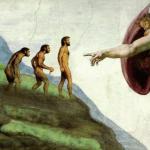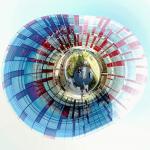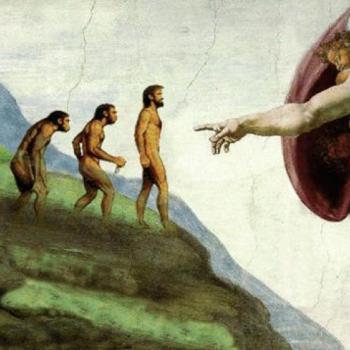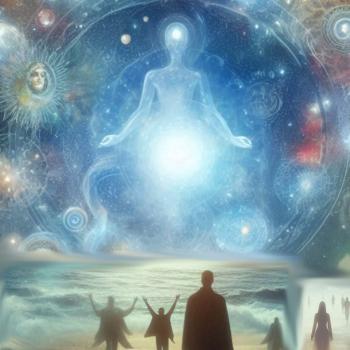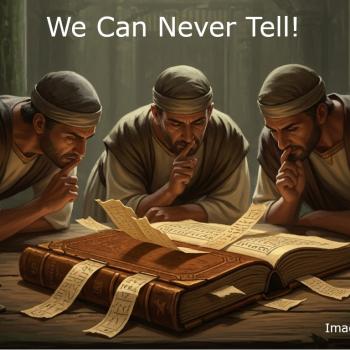Science, philosophy, and religion – different evaluations
Science demands that studies be replicable 100% (able to be reproduced exactly). Philosophy can also be harsh, and this is closer to the way we think.

Image by Rant73 on Flickr
The philosophers’ spoiler tool of Reductio ad absurdum (reduction to absurdity to find contradiction), is itself absurd when applied to life and prayer. Real life isn’t 100% on anything. Life is messy and holds too many variables besides spiritual variables. Yet how many of us practice this thinking in our daily life? We find that our prayer didn’t work, we think therefore prayer doesn’t work and there is no God? Nothing, not even hard science, is without flaws, contradictions, nor is always replicable.
Reality: Prayer doesn’t get the desired result every time. I keep telling people that life isn’t like that. Life isn’t lived at the extremes of 0 and 100. Some philosophers, statisticians, and scientists like to point to low results and say about themselves that science is repeatable with the same result every time, they forget the exceptions in their own work that they believe don’t prove their theory incorrect. So everything that isn’t 100% is hokum. And if they can’t put it under a microscope and examine it, it doesn’t exist.
Here’s reality in science: Science doesn’t know what over 90% of the universe is made of. Scientists hypothesize that there is Dark Matter and Dark Energy, which is an exciting area of research. But so far there is no proof. But with all of this uncertainty, scientists can send still spacecraft into space. Their formulas still work even if they have to use constants for unknowns.
Science searches for what it wants to find
Without any proof at all scientists searched endlessly for the theoretical Higgs boson particle, AKA the “God Particle.” No experiment had observed the Higgs boson to confirm the theory, but they believed it had to be there. A massive scalar boson with zero spin and no electric charge, the particle helps give mass to all elementary particles that have mass, such as electrons and protons. It was elusive. But science seems to find what it’s looking for, or disprove the theory. At the Cern particle accelerator they eventually found the Higgs Boson.
Faith also finds what it’s looking for
In faith we also find what we’re looking for, to prove or disprove our belief. I like to say from my studies of Jesus’ teachings, that what he meant by “this is very true,” is not that it was science or philosophy truth, but that you can count on what he was saying. It’s reliable in life.
The essence of Jesus’ teachings is love. Nearly everyone responds positively to love. There are a few who don’t: possibly psychopaths and narcissists. And people who have learned in childhood to distrust others. So are Jesus’ ways 100%? One-hundred percent is the wrong standard to live by. It’s like saying automobiles aren’t 100% reliable because you may run over a nail and get a flat tire. This doesn’t stop people from relying on automobiles for travel. It doesn’t stop scientists from depending on automobiles to get them to work.
Faith is confidence in what we believe true, not science
Faith is confidence in the unseen. “… the assurance of things hoped for, the conviction of things not seen” (Hebrews 11:1, NAS). But it isn’t “blind.” Blind faith isn’t a term found in the Bible, it’s a rather contemptuous term often used to denigrate the religious.
Faith isn’t built on fiction. Knowing the “truth” doesn’t destroy faith. It purifies it.
Faith is learned trust. Our lived experience proves the truth. Judaism, Christianity, and many other religions, are propelled forward in the lives of people through history, not because they are convenient myths used as a crutch, not because people take a “leap of faith,” but because they are tested in people’s lives and found to work. If they didn’t, they would soon fade away like most myths. Ancient people mostly stopped trying to appease the gods through human sacrifice because nothing changed when they sacrificed, people noted the failure, thought sacrificing people was horrible, and stopped.
People no longer worship the ancient Greek God Zeus and that pantheon. While still popular in mythology, actual worship ended around 1600 years ago. Baal was worshipped by the Canaanites, and later the Egyptians, but that ended around 1075 BCE. Religions that don’t work cease to be.
The proof of the effects of prayer comes to us in our own lives. We keep what works. When you pan for golden nuggets of wisdom, you don’t throw the gold out with the dirty water. You keep the gold.
Comparing the expectations of science and religion adds some perspective
The question becomes does prayer work in some form with results that are statistically significant and reason for hope? We need hope. Sometimes we need a kickstart. Despite that there is always someone doing opposing research and using bad methodologies to get the results they want, we can say yes because we prove it in our own lives. We usually aren’t going to pray the old who are dying back to good health, but it is an influence on many things. It’s our lived experience. It’s part of our faith.
We need to keep in perspective what science is, and what religion and faith are. They operate in two very different arenas.
Pray and keep communicating with God. It works.
Take Home Points
Science has no firm idea concerning what constitutes over 90% of the universe, but demands 100% replication of religion. But science devotes a huge amount of time and attention to discovery of things it speculates might be there, then finds it. Yet a few scientists ridicule religion.
Faith also finds what it’s looking for, based on what works.
Pray and keep communicating with God. It works.
Series Links
Some think they deserve to suffer and die
Is prayer a conveyor belt of miracles?
Is the action of God in the universe responsible for much?
Criticism of studies on prayer, and of science
Science and philosophy have their own standard: 100%
Our answer is God. God’s answer is us. Together we make the world a better place.
– Dorian
Other Patheos writers on prayer



